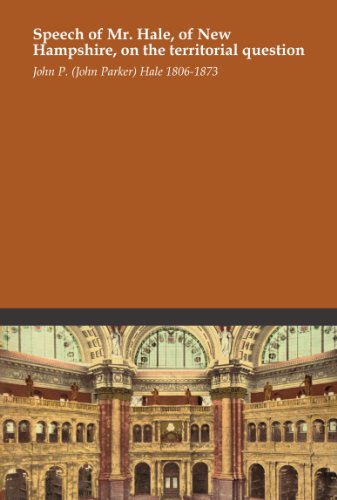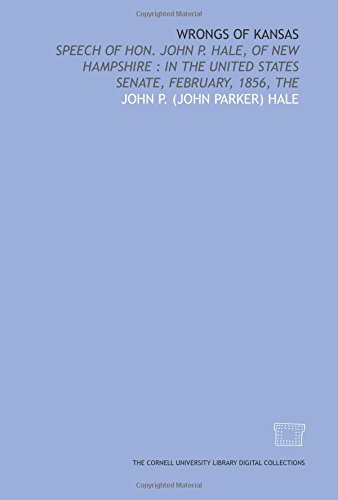Background
John Parker Hale was born on March 31, 1806, at Rochester, New Hampshire, United States



(This reproduction was printed from a digital file created...)
This reproduction was printed from a digital file created at the Library of Congress as part of an extensive scanning effort started with a generous donation from the Alfred P. Sloan Foundation. The Library is pleased to offer much of its public domain holdings free of charge online and at a modest price in this printed format. Seeing these older volumes from our collections rediscovered by new generations of readers renews our own passion for books and scholarship.
http://www.amazon.com/gp/product/B003TU2MAE/?tag=2022091-20

(Originally published in 1856. 16 pages. This volume is pr...)
Originally published in 1856. 16 pages. This volume is produced from digital images from the Cornell University Library Samuel J. May Anti-Slavery Collection
http://www.amazon.com/gp/product/1429747269/?tag=2022091-20
Diplomat attorney lawyer politician
John Parker Hale was born on March 31, 1806, at Rochester, New Hampshire, United States
He attended Phillips Exeter Academy and graduated from Bowdoin College in 1827.
He studied law at Rochester and Dover, New Hampshire.
John Parker Hale was admitted to the bar at Dover in 1830 and became known as a successful jury lawyer.
In 1832 he was elected to the state legislature, and in 1834 was appointed United States district attorney.
In 1842 he was elected to the United States House of Representatives as a Democrat. He opposed the annexation of Texas because of his antislavery convictions, breaking with the Democratic Party in 1845.
This event, coupled with his campaign to win New Hampshire for the antislavery cause, was known as the "Hale Storm of 1845. "
He was elected to the United States Senate in 1846 and served until 1853.
He secured the abolition of flogging in the Navy, and he lectured on abolition throughout the North.
During the Civil War, he held the chairmanship of the naval affairs committee.
He was acquitted by the Senate judiciary on charges of fraud with a New Hampshire naval yard.
In 1864 he was defeated for re-nomination to the Senate by the Republican caucus. He was appointed minister to Spain in 1865, but in 1869 he was recalled to the United States.
John Parker Hale served in the United States House of Representatives from 1843 to 1845 and in the United States Senate from 1847 to 1853 and from 1855 to 1865.
He was known for his oratory and his frequently radical democratic principles.
In the House of Representatives, he came to prominence as a champion of anti-slavery forces.
(This reproduction was printed from a digital file created...)
(Originally published in 1856. 16 pages. This volume is pr...)
In 1842 he was elected to the United States House of Representatives as a Democrat.
He opposed the annexation of Texas because of his antislavery convictions, breaking with the Democratic Party in 1845.
In 1847 he was nominated for the presidency by the Liberty Party, but withdrew in favor of Martin Van Buren when the new Free Soil Party absorbed Liberty Party adherents in 1848.
In 1864 he was defeated for re-nomination to the Senate by the Republican caucus.
U. S. House of Representatives, New Hampshire House of Representatives, United States Senate
